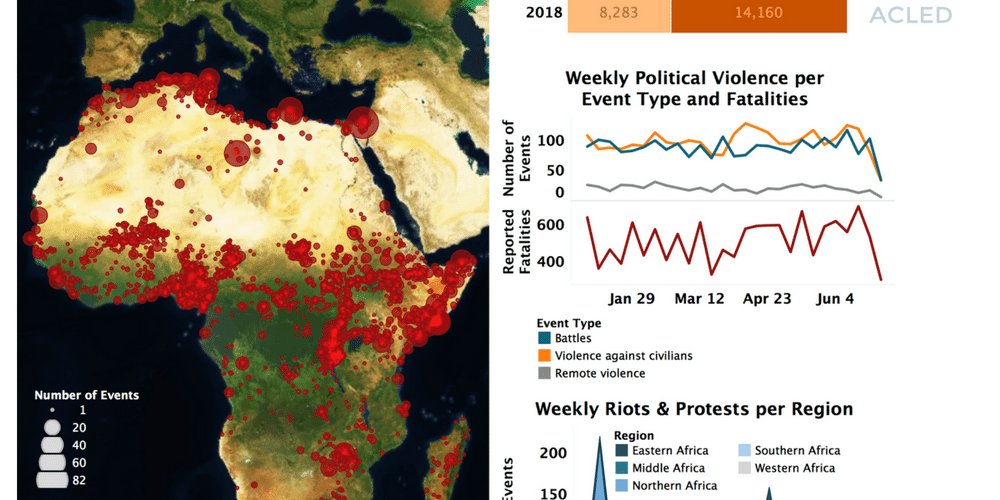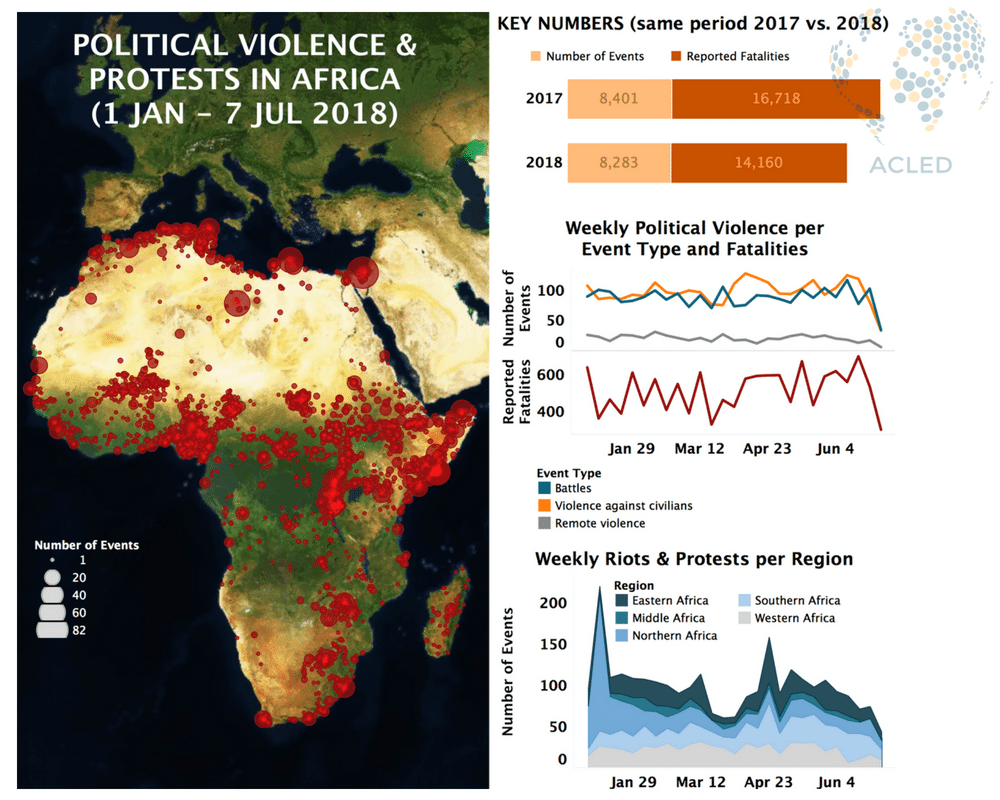Key political violence highlights from the first week of July 2018 in Africa include the cross-border incidents between Uganda and the DRC, Ethiopia and Sudan, and Burundi and Rwanda; the targeting of French officials and troops in Cameroon and Mali; and the signs of political tensions in Algeria and Ivory Coast.
There were notable episodes of cross-border violence on the week of July 1st. Activity increased at the border between Uganda and the Democratic Republic of Congo (DRC) at Lake Edward on July 5th, as naval patrols from both countries clashed on the Lake, causing casualties. Two days later, the Ugandan army shot at eight fishermen during a patrol on the Lake, leaving another seven killed. Violence was also reported along the border between Ethiopia and Sudan. Sudanese armed forces were accused of killing Ethiopian farmers at a disputed farmland in the Metema area of Amhara region on June 30th; this led to a clash with Ethiopian forces in the same area on July 3rd. On July 4th, Ethiopian gunmen were also said to have penetrated into Sudan and abducted farmers from El Lagadi in El Gedaref, Kassala state. Finally, violence by Burundian gunmen was reported in both Rwanda and the DRC. In Rwanda, suspected Burundian assailants attacked Nyaruguru District for the third time in less than two weeks, on July 1st, firing shots in the air, abducting people and looting property. In the DRC, Burundian groups like the Resistance to the Rule of Law in Burundi (Red-Tabara), the Front for Democracy in Burundi (FRODEBU) and the Republican Forces of Burundi (FOREBU) fought in support of various armed groups in Uvira, Sud-Kivu, reinforcing the instability that has been affecting the region since April.
Second, French officials and forces were targeted in Cameroon and Mali. In Cameroon, Ambazonian separatists allegedly attacked the convoy of the French Secretary of State directed to Buea in Fako, Sud-Ouest, on June 29th, leaving two soldiers killed and several others wounded. Fighting between the separatists and the government has escalated over the past weeks. In Mali, a Group for Support of Islam and Muslims (JNIM) suicide bomber detonated an explosives-laden vehicle against a convoy of French Barkhane forces and Malian soldiers in northern Gao on July 1st. Five civilians were killed and 24 others wounded in the blast, along with eight French soldiers. Tensions remained high in Gao in the days that followed.
Finally, there were important signs of political tensions in Algeria and Ivory Coast. In Algeria, on July 4th, President Bouteflika fired the head of the national gendarmerie and the head of Algiers security. Bouteflika had fired the head of the police forces and directorate of national security (DGSN) the week before. Some suggest it is connected to a recent cocaine scandal, but no official reason has been given, and the dismissals could be a sign that fracture lines and competition are increasing among the Algerian elites. In Ivory Coast, political tensions are rising again before the 2020 elections. Divisions within the ruling coalition were visible as President Ouattara dissolved the government on July 4th and tasked Prime Minister Coulibaly with forming a new one. Tensions also ran high between government and opposition supporters in Korhogo (Ouattara’s hometown) as youth attacked participants at a pro-Guillaume Soro (a potential opposition candidate) event organised by the Grouping for Ivory Coast (RACI). The events came as Ouattara has been seeking to assert his political ambitions ahead of the 2020 presidential elections: in June, he announced that– despite apparent constitutional term limits– he was free to run again for two more presidential terms under the 2016 constitution. His party also refused to form a joint ticket with the Democratic Party (PDCI), which backed him up in the previous elections, over PDCI’s insistence that Ouattara returns the favour and backs a candidate of its choosing in 2020.
Elsewhere on the African continent, Al Shabaab continued its heavy activity in Somalia’s Lower Shabelle and Lower Jubbada regions; insurgent factions clashed with government forces on several occasions in both Sudan and South Sudan; while thousands of police forces in Nigeria’s Maiduguri protested to demand months of back pay while they continue to tackle the Boko Haram insurgency in the north. The Imbonerakure youth in Burundi continued its abuses against political opponents, though at a far more reduced pace than during the constitutional referendum; and the leaders of Eritrea and Ethiopia signed a declaration ending the state of war between the two countries.
AfricaAnalysisCivilians At RiskCurrent HotspotsRemote ViolenceRioting And ProtestsViolence Against Civilians







